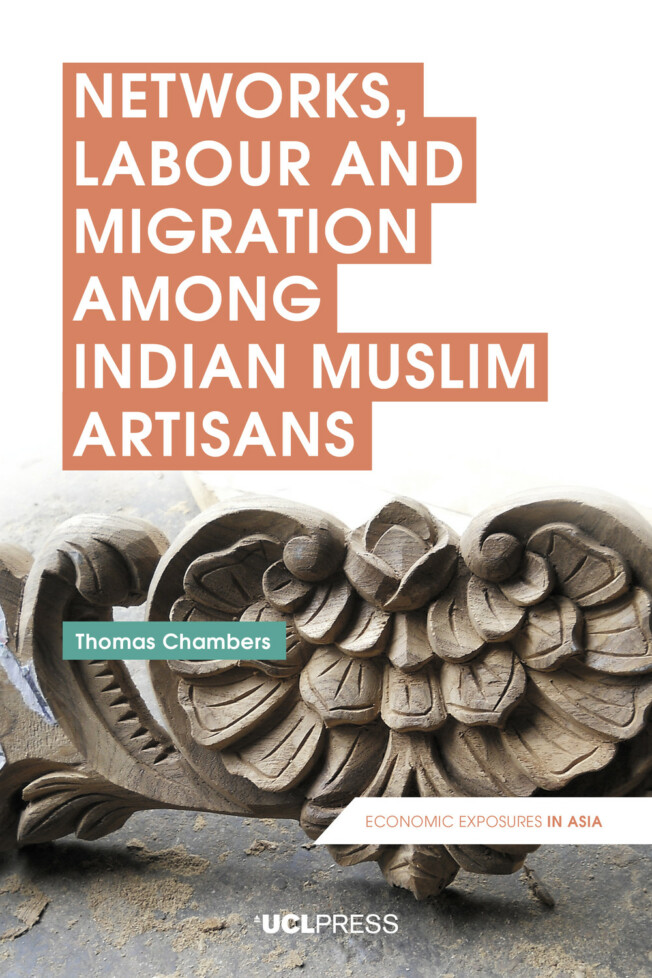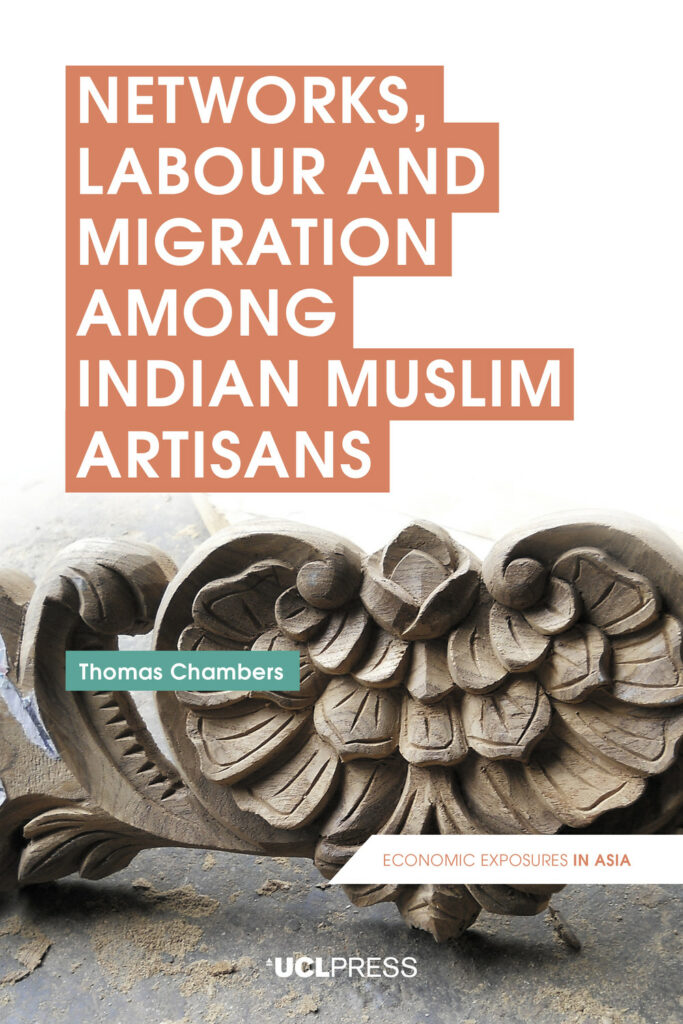
Networks, Labour and Migration among Indian Muslim Artisans
Thomas Chambers (Author)
Series: Economic Exposures in Asia
Networks, Labour and Migration among Indian Muslim Artisans provides an ethnography of life, work and migration in a North Indian Muslim-dominated woodworking industry. It traces artisanal connections within the local context, during migration within India, and to the Gulf, examining how woodworkers utilise local and transnational networks, based on identity, religiosity, and affective circulations, to access resources, support and forms of mutuality. However, the book also illustrates how liberalisation, intensifying forms of marginalisation and incorporation into global production networks have led to spatial pressures, fragmentation of artisanal labour, and forms of enclavement that persist despite geographical mobility and connectedness.
By working across the dialectic of marginality and connectedness, Thomas Chambers thinks through these complexities and dualities by providing an ethnographic account that shares everyday life with artisans and others in the industry. Descriptive detail is intersected with spatial scales of ‘local’, ‘national’ and ‘international’, with the demands of supply chains and labour markets within India and abroad, with structural conditions, and with forms of change and continuity. Empirically, then, the book provides a detailed account of a specific locale, but also contributes to broader theoretical debates centring on theorisations of margins, borders, connections, networks, embeddedness, neoliberalism, subjectivities, and economic or social flux.
Praise for Networks, Labour and Migration among Indian Muslim Artisans
‘a beautifully written ethnographic account…The attention to individual lives and the struggle to live a decent life is one of the book’s most obvious strengths. In recent years, the bodily acts of craftwork and descriptions of manual skills have gained increasing attention within anthropological research. What has been missing from academic publications are individual stories of artisans in a small urban setting. This book renders craftworkers as central, rather than marginal, and thereby represents an important contribution.’
The Journal of the Royal Anthropological Institute (JRAI)
‘A revealing book. In addition to its usefulness as a critical survey of the theoretical and historical models currently in use to understand artisanship in contemporary India and elsewhere, and the ethnographic detail it offers of the Indian woodworking industry, by insisting on the local and the particular as its unit of analysis it offers a challenge to universalising accounts of the experience of contemporary South Asian artisans.’
The Journal of Modern Craft
‘Chambers’ research on how women’s labour is devalued and underpaid lays the ground for future researchers on how women offer care and strength to each other within patriarchal settings.’
moneycontrol.com
‘Networks, Labour and Migration among Indian Muslim Artisans by Thomas Chambers is a substantial ethnography of Muslim artisan woodworkers in the northern Indian city of Saharanpur that admirably evokes the “human actuality” of their working worlds.’
ILR Review
1. Marginalisation, connectedness and Indian Muslim artisans: an introduction
2. A brief history of Indian Muslim artisans
3. The Indian craft supply chain: money, commodities and intimacy
4. Muslim women and craft production in India: gender, labour and space
5. Apprenticeship and labour amongst Indian Muslim artisans
6. Neoliberalism and Islamic reform among Indian Muslim artisans: affect and self-making
7. Friendship, urban space, labour and craftwork in India
8. Internal migration in India: imaginaries, subjectivities and precarity
9. Labour migration between India and the Gulf: regimes, Imaginaries and continuities
10. Marginalisation and connectedness: a conclusion
Glossary of Hindi, Urdu and Arabic terms
References
Index
DOI: 10.14324/111.9781787354531
Number of pages: 292
Number of illustrations: 30
Publication date: 30 April 2020
PDF ISBN: 9781787354531
EPUB ISBN: 9781787354562
Hardback ISBN: 9781787354555
Paperback ISBN: 9781787354548
Thomas Chambers (Author)
Thomas Chambers is an Anthropologist with a PhD in Social Anthropology from the University of Sussex. He has lengthy experience researching in India, specifically the geographical region of North-West Uttar Pradesh, and his focus covers migration, urban space, conviviality, government documents and paperwork, digitisation, labour, Islam, and artisans. Thomas is currently Senior Lecturer at Oxford Brookes University and continues to regularly engage in fieldwork in India and the Gulf.
‘A revealing book. In addition to its usefulness as a critical survey of the theoretical and historical models currently in use to understand artisanship in contemporary India and elsewhere, and the ethnographic detail it offers of the Indian woodworking industry, by insisting on the local and the particular as its unit of analysis it offers a challenge to universalising accounts of the experience of contemporary South Asian artisans.’
The Journal of Modern Craft
‘Chambers’ research on how women’s labour is devalued and underpaid lays the ground for future researchers on how women offer care and strength to each other within patriarchal settings.’
moneycontrol.com
‘a beautifully written ethnographic account…The attention to individual lives and the struggle to live a decent life is one of the book’s most obvious strengths. In recent years, the bodily acts of craftwork and descriptions of manual skills have gained increasing attention within anthropological research. What has been missing from academic publications are individual stories of artisans in a small urban setting. This book renders craftworkers as central, rather than marginal, and thereby represents an important contribution.’
The Journal of the Royal Anthropological Institute (JRAI)
‘an insightful doorway into the personal and economic realities limiting but also often creatively and socially addressed with efficacy in the Muslim artisan communities of norther Indian and the places they have relocated.’ Ethos
‘Networks, Labour and Migration among Indian Muslim Artisans by Thomas Chambers is a substantial ethnography of Muslim artisan woodworkers in the northern Indian city of Saharanpur that admirably evokes the “human actuality” of their working worlds.’
ILR Review
‘An insightful doorway into the personal and economic realities limiting but also often creatively and socially addressed with efficacy in the Muslim artisan communities of norther Indian and the places they have relocated.’
Ethos
Related titles
Environment and Post-Soviet Transformation in Kazakhstan’s Aral Sea Region
William Wheeler,
25 October 2021
Networks, Labour and Migration among Indian Muslim Artisans
Networks, Labour and Migration among Indian Muslim Artisans provides an ethnography of life, work and migration in a North Indian Muslim-dominated woodworking industry. It traces artisanal connections within the local context, during migration within India, and to the Gulf, examining how woodworkers utilise local and transnational networks, based on identity, religiosity, and affective circulations, to access resources, support and forms of mutuality. However, the book also illustrates how liberalisation, intensifying forms of marginalisation and incorporation into global production networks have led to spatial pressures, fragmentation of artisanal labour, and forms of enclavement that persist despite geographical mobility and connectedness.
By working across the dialectic of marginality and connectedness, Thomas Chambers thinks through these complexities and dualities by providing an ethnographic account that shares everyday life with artisans and others in the industry. Descriptive detail is intersected with spatial scales of ‘local’, ‘national’ and ‘international’, with the demands of supply chains and labour markets within India and abroad, with structural conditions, and with forms of change and continuity. Empirically, then, the book provides a detailed account of a specific locale, but also contributes to broader theoretical debates centring on theorisations of margins, borders, connections, networks, embeddedness, neoliberalism, subjectivities, and economic or social flux.
Praise for Networks, Labour and Migration among Indian Muslim Artisans
‘a beautifully written ethnographic account…The attention to individual lives and the struggle to live a decent life is one of the book’s most obvious strengths. In recent years, the bodily acts of craftwork and descriptions of manual skills have gained increasing attention within anthropological research. What has been missing from academic publications are individual stories of artisans in a small urban setting. This book renders craftworkers as central, rather than marginal, and thereby represents an important contribution.’
The Journal of the Royal Anthropological Institute (JRAI)
‘A revealing book. In addition to its usefulness as a critical survey of the theoretical and historical models currently in use to understand artisanship in contemporary India and elsewhere, and the ethnographic detail it offers of the Indian woodworking industry, by insisting on the local and the particular as its unit of analysis it offers a challenge to universalising accounts of the experience of contemporary South Asian artisans.’
The Journal of Modern Craft
‘Chambers’ research on how women’s labour is devalued and underpaid lays the ground for future researchers on how women offer care and strength to each other within patriarchal settings.’
moneycontrol.com
‘Networks, Labour and Migration among Indian Muslim Artisans by Thomas Chambers is a substantial ethnography of Muslim artisan woodworkers in the northern Indian city of Saharanpur that admirably evokes the “human actuality” of their working worlds.’
ILR Review
‘A revealing book. In addition to its usefulness as a critical survey of the theoretical and historical models currently in use to understand artisanship in contemporary India and elsewhere, and the ethnographic detail it offers of the Indian woodworking industry, by insisting on the local and the particular as its unit of analysis it offers a challenge to universalising accounts of the experience of contemporary South Asian artisans.’
The Journal of Modern Craft
‘Chambers’ research on how women’s labour is devalued and underpaid lays the ground for future researchers on how women offer care and strength to each other within patriarchal settings.’
moneycontrol.com
‘a beautifully written ethnographic account…The attention to individual lives and the struggle to live a decent life is one of the book’s most obvious strengths. In recent years, the bodily acts of craftwork and descriptions of manual skills have gained increasing attention within anthropological research. What has been missing from academic publications are individual stories of artisans in a small urban setting. This book renders craftworkers as central, rather than marginal, and thereby represents an important contribution.’
The Journal of the Royal Anthropological Institute (JRAI)
‘an insightful doorway into the personal and economic realities limiting but also often creatively and socially addressed with efficacy in the Muslim artisan communities of norther Indian and the places they have relocated.’ Ethos
‘Networks, Labour and Migration among Indian Muslim Artisans by Thomas Chambers is a substantial ethnography of Muslim artisan woodworkers in the northern Indian city of Saharanpur that admirably evokes the “human actuality” of their working worlds.’
ILR Review
‘An insightful doorway into the personal and economic realities limiting but also often creatively and socially addressed with efficacy in the Muslim artisan communities of norther Indian and the places they have relocated.’
Ethos

